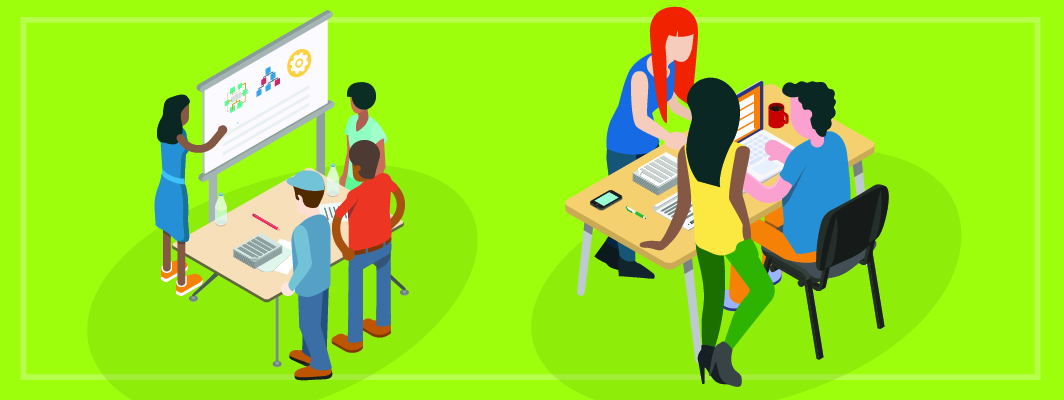
NTC is a multi-day conference jam-packed with interactive workshops, engaging speakers, relevant vendors, ignite sessions (thought-provoking presentations only five minutes long), and opportunities to connect with other mission-driven techies from across the country. NTC models inclusive and health-conscious practices throughout the conference by providing real-time captioning during general sessions and intentional spaces reserved for lactation, meditation, prayer, or quiet.
This was my first time attending the conference and I ran into an expected issue: too many interesting and relevant sessions and too little time to attend them all. The solution? Prioritize sessions that were most relevant to my work—that is, engaging adults in online and blended learning paradigms—and download collaborative notes (with presentation slides and speaker info) from the sessions I couldn’t attend.
A few of the stand-out workshops I did attend tackled a range of topics, including multi-directional learning, mapping digital ecosystems, creating engaging online learning experiences, and strategic knowledge management.
How can students and teachers learn from each other on common issues, solutions, strategies, and pitfalls? Multi-directional learning is a learner-centered approach that focuses on distributing learning and power by examining several exchanges that happen among individuals in a learning atmosphere, as everyone has knowledge to share.
Nonprofits can create a safe and nurturing learning environment that facilitates the multi-directional approach. For example, NGO Source and Oracle NetSuite Social Impact re-designed programs and events with co-learning objectives and multi-directional learning activities, beginning with “Buildathon 4 Good,” a day-long event where local nonprofits present their challenges and work with Netsuite Social Impact technologists to identify solutions. Multi-directional learning is especially relevant to adult learners who enter the classroom with resources, knowledge, and experiences from their life. Adults learn best when they can connect new knowledge and skills to what they already know.
Try this: Nonprofit organizations serving adult learners can revamp their programs and services (and in turn, reinvigorate their staff engagement) by using a multi-directional learning approach.
Avoiding silos, knowing who you’re trying to reach, and improving efficiency are a few reasons why mapping your organization’s digital ecosystem is worth the time and effort. The goal is to map out the people, data, systems, processes, and products that, when used together, achieve common goals. Visual mapping (which you can see an example of in our latest interactive report on workforce development) can reveal duplicate systems as well as time-consuming and inefficient manual processes. Below are a few online tools and software suggestions that can help your organization during this process.
Online
Software
Try this: Before using online tools to help your organization identify its strengths and weaknesses, it’s key to have organizational buy-in to include and represent systems across all departments and build alignment before and during the digital ecosystem mapping.
In the past decade, organizations have turned to online learning to create informed trainings and reach more people. Trainings can last 30, 60 or 90 minutes—they can be focused on stand-alone topics or part of a months-long series. Organizations can create more effective and engaging online learning experiences by dedicating time to focus on people, the platform, and the process. Check out this worksheet as a resource when you’re starting to plan your learning experience that will help with marketing and content development.
Try this: Consider meeting your audience where they’re at by tailoring the content to make it more comprehensible and applicable. This is especially important for adult learners who are not starting from scratch, but have a wealth of knowledge and experiences to build on.
From classes on Microsoft Office basics to services on civic engagement and employment, libraries and other social service programs play a pivotal role in reducing the Digital Learning Gap. In order to serve the communities in need of digitally inclusive programming, understand your audience. Conducting pre-surveys to assess baseline knowledge and skill sets provides a roadmap of where to start and where to go. For those interested in improving their trainings and services, require feedback and iteration. One way is to use a daily feedback form to ask instructors and learners alike at the end of each class what worked, what didn’t, and what should be changed.
Resources
Try this: Where possible, take action at the public policy level to address digital inclusion. Advocate for federal policies and local programs that support digital equity, such as local authority to negotiate public benefit agreements with commercial providers.
Stay up-to-date with the latest in the field
Interested in the latest ideas and technologies to improve adult learning and workforce development? Sign up for Digital Promise’s Spotlight newsletter, a monthly digest highlighting current initiatives and innovations to reduce the digital literacy gap and expand economic opportunities in adult learning communities.